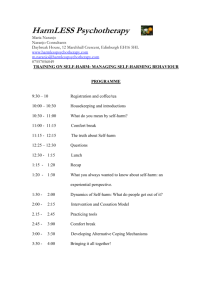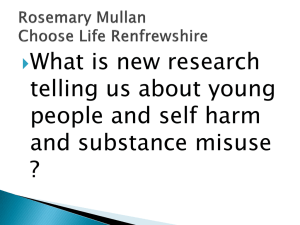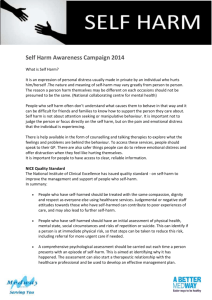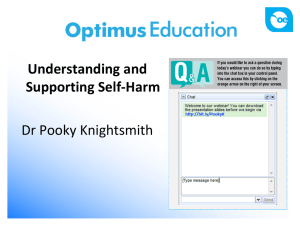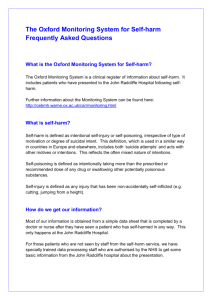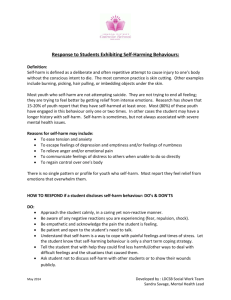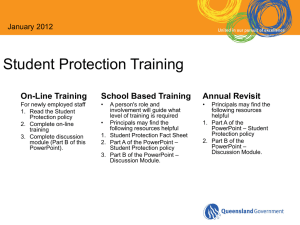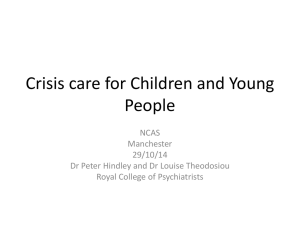Self harm -Things to do - Aberdeen Performing Arts
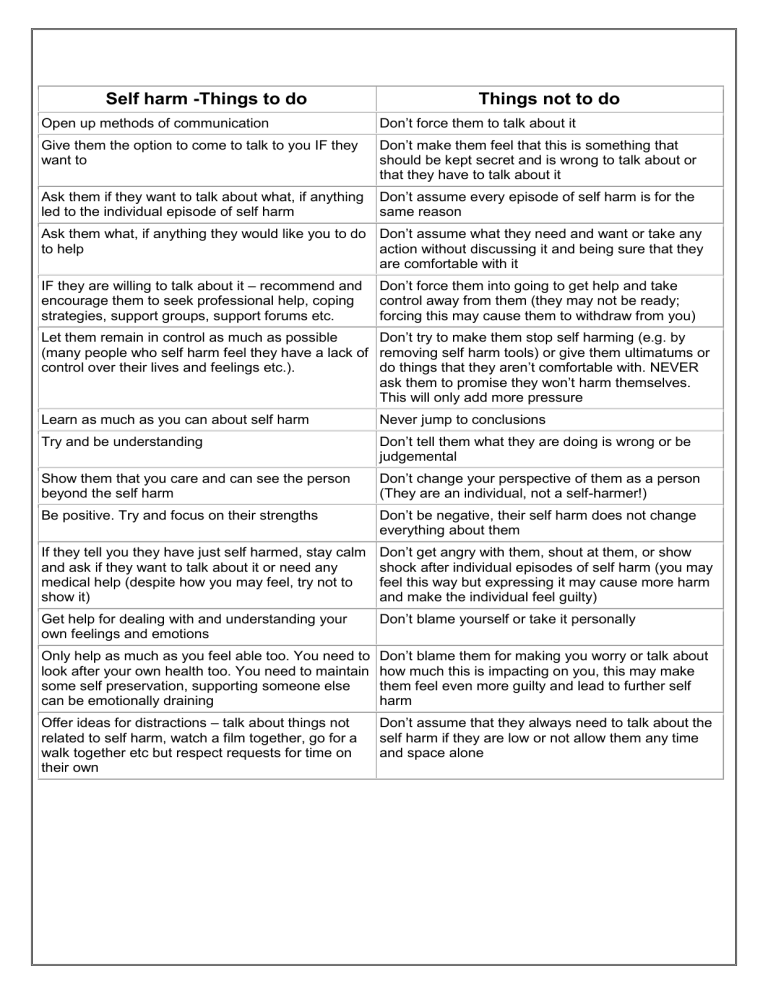
Self harm -Things to do Things not to do
Open up methods of communication
Give them the option to come to talk to you IF they want to
Ask them if they want to talk about what, if anything led to the individual episode of self harm
Don’t force them to talk about it
Don’t make them feel that this is something that should be kept secret and is wrong to talk about or that they have to talk about it
Don’t assume every episode of self harm is for the same reason
Ask them what, if anything they would like you to do to help
IF they are willing to talk about it – recommend and encourage them to seek professional help, coping strategies, support groups, support forums etc.
Don’t assume what they need and want or take any action without discussing it and being sure that they are comfortable with it
Don’t force them into going to get help and take control away from them (they may not be ready; forcing this may cause them to withdraw from you)
Let them remain in control as much as possible
(many people who self harm feel they have a lack of control over their lives and feelings etc.).
Don’t try to make them stop self harming (e.g. by removing self harm tools) or give them ultimatums or do things that they aren’t comfortable with. NEVER ask them to promise they won’t harm themselves.
This will only add more pressure
Learn as much as you can about self harm
Try and be understanding
Show them that you care and can see the person beyond the self harm
Be positive. Try and focus on their strengths
Never jump to conclusions
Don’t tell them what they are doing is wrong or be judgemental
Don’t change your perspective of them as a person
(They are an individual, not a self-harmer!)
Don’t be negative, their self harm does not change everything about them
If they tell you they have just self harmed, stay calm and ask if they want to talk about it or need any medical help (despite how you may feel, try not to show it)
Offer ideas for distractions – talk about things not related to self harm, watch a film together, go for a walk together etc but respect requests for time on their own
Don’t get angry with them, shout at them, or show shock after individual episodes of self harm (you may feel this way but expressing it may cause more harm and make the individual feel guilty)
Don’t blame yourself or take it personally
Get help for dealing with and understanding your own feelings and emotions
Only help as much as you feel able too. You need to look after your own health too. You need to maintain some self preservation, supporting someone else can be emotionally draining
Don’t blame them for making you worry or talk about how much this is impacting on you, this may make them feel even more guilty and lead to further self harm
Don’t assume that they always need to talk about the self harm if they are low or not allow them any time and space alone
What is self-harm?
Self-harm happens when someone hurts or harms themselves. They may:
take too many tablets – an overdose; cut themselves; burn their body; bang their head or throw their body against something hard; punch themselves; stick things in their body; swallow inappropriate objects.
It can feel to other people that these things are done coolly and deliberately
– almost cynically. But someone who self-harms will usually do it in a state of high emotion, distress and unbearable inner turmoil. Some people plan it in advance, others do it suddenly. Some people self-harm only once or twice, but others do it regularly - it can become almost like an addiction.
Some of us harm ourselves in less obvious, but still serious, ways. We may behave in ways that suggest we don't care whether we live or die
– we may take drugs recklessly, have unsafe sex, or binge drink. Some people simply starve themselves.
Other words that are used to describe self-harm
These terms were previously used to describe self-harm, but are now going out of use:
Deliberate self-harm (DSH) - the word 'deliberate' unhelpfully blamed individuals for their self-harm.
Suicide/Parasuicide
– these terms implied that people harmed themselves with intent to kill themselves, which is often not the case.
Who self-harms?
About 1 in 10 young people will self-harm at some point, but it can occur at any age.
It is more common in young women than men.
Self-harm is more common in some groups of people, such as prisoners, asylum seekers and veterans of the armed forces.
Gay, lesbian and bisexual people are more likely to self-harm than heterosexual people. Researchers think that this is may be due at least in part to the stress individuals may experience as a result of prejudice and discrimination.
Sometimes groups of young people self-harm together. Having a friend who selfharms may increase your chances of doing it as well.
People who self-harm are more likely to have experienced physical, emotional or sexual abuse during childhood.
Research probably under-estimates how common self-harm is. Our estimates are often based on surveys of people who go to hospital or their GP after harming themselves. However, we know that many people do not seek help after self-harm.
Some types of self-harm, like cutting, may be more secret and so less likely to be noticed by other people.
In a recent study of over 4000 self-harming adults in hospital, 80% had overdosed and around 15% had cut themselves. In the community, it is likely that cutting is a more common way of self-harming than taking an overdose.
What makes people self-harm?
Research has shown that many people who harm themselves are struggling with intolerable distress or unbearable situations. People often struggle with difficulties for some time before they self-harm. Common problems for people who self-harm include:
physical or sexual abuse; feeling depressed; feeling bad about yourself; relationship problems with partners, friends, and family; being unemployed, or having difficulties at work;
You may be more likely to harm yourself if you feel:
that people don’t listen to you; hopeless; isolated, alone; out of control; powerless – it feels as though there's nothing you can do to change anything.
You may be more likely to harm yourself if you are using alcohol or drugs – it may feel that these are as out of control as the rest of your life.
How does it make you feel?
Self-harm can help you to feel in control, and reduce uncomfortable feelings of tension and distress. If you feel guilty, it can be a way of punishing yourself and relieving your guilt. Either way, it can become a 'quick fix' for feeling bad.
Are people who self-harm mentally ill?
Most people who self-harm are not mentally ill. However, some may be depressed, or have severe personality difficulties, or be addicted to alcohol and drugs. They all still need help. After someone has harmed themselves, the risk of them killing themselves increases. Everyone who self-harms should be taken seriously and offered help
